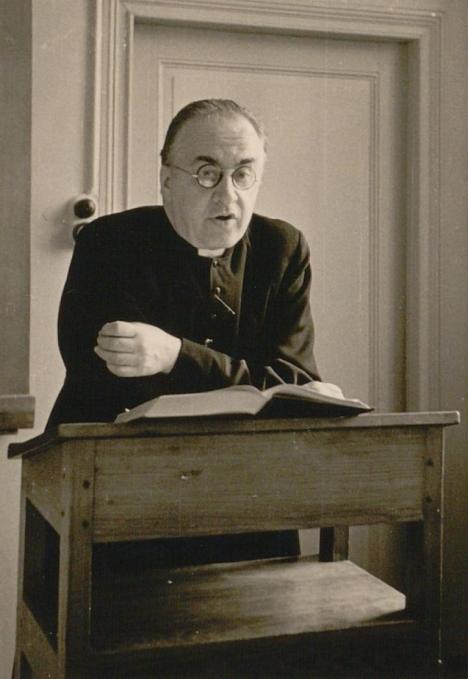Georges Lemaître

Leuven has a brand-new urban artwork, a tribute to Georges Lemaître and his revolutionary Big Bang Theory. Leuven professor and priest Georges Lemaître (1894-1966) is the father of the groundbreaking Big Bang Theory. In 1927, Lemaître argued that the universe is constantly expanding, and in 1931 he revealed his hypothesis – that the universe began with a single ‘primaeval atom’. So, it’s high time that we got to know this renowned scientist better.
Professor and priest
Georges Lemaître was born in Charleroi, Belgium, on 17 July 1894. After having fought on the Yser Front in the Great War, he went on to study physics and mathematics, followed by theology. He was ordained as a priest in 1923. In 1925, he was appointed a professor of KU Leuven (called the Catholic University of Leuven at the time), where he continued his cosmological research.
Lemaître spent much of the 1920s abroad. He worked in esteemed institutions such as Cambridge University in England and garnered his doctoral degree from the prestigious MIT in the United States. While in the U.S., he crossed paths with other prominent cosmologists and astronomers, such as Edwin Hubble.
Primeval Atom
Inspired by the wealth of theories and insights he came across, he published his now-famous article in the journal Nature in 1931.
What packed a punch was how Lemaître went against the prevailing scientific theories. In those days, everyone believed the universe to be static and that it had been that way forever. Lemaître, however, cleverly used Albert Einstein’s Theory of Relativity to prove how the universe has been expanding since the dawn of time. That meant that once upon a time, the universe originated from a single primaeval atom. It was ‘day 0’ when time’s clock first began to tick, and space sprang into being. He dubbed it ‘the day without yesterday’.
The Big Bang Theory
For decades, Lemaître’s theory was heatedly contested; one of his peers even jokingly renamed it ‘The Big Bang Theory’. His insights remained largely overlooked throughout the twentieth century.
It was only in the 1960s that his theory gained widespread acceptance, when slowly but surely his work was recognised for the pioneering feat it was. However, despite several nominations, he would never be awarded the Nobel Prize.
A separation of faith and science
What may seem unusual for this, and recent generations is that Georges Lemaître was also a priest. However, he was able to keep his perspectives as a priest and cosmologist strictly separate. He saw faith and science as two distinct worlds; trying to make the creation and the Big Bang mesh was never his objective. Today that might seem like a given, but back then – ninety years ago – it was a stretch. And yet, even the Vatican esteemed Georges Lemaître, electing him president of the Pontifical Academy of Sciences in 1960.
Georges Lemaître died on the 20th of June in Leuven, in 1966.

